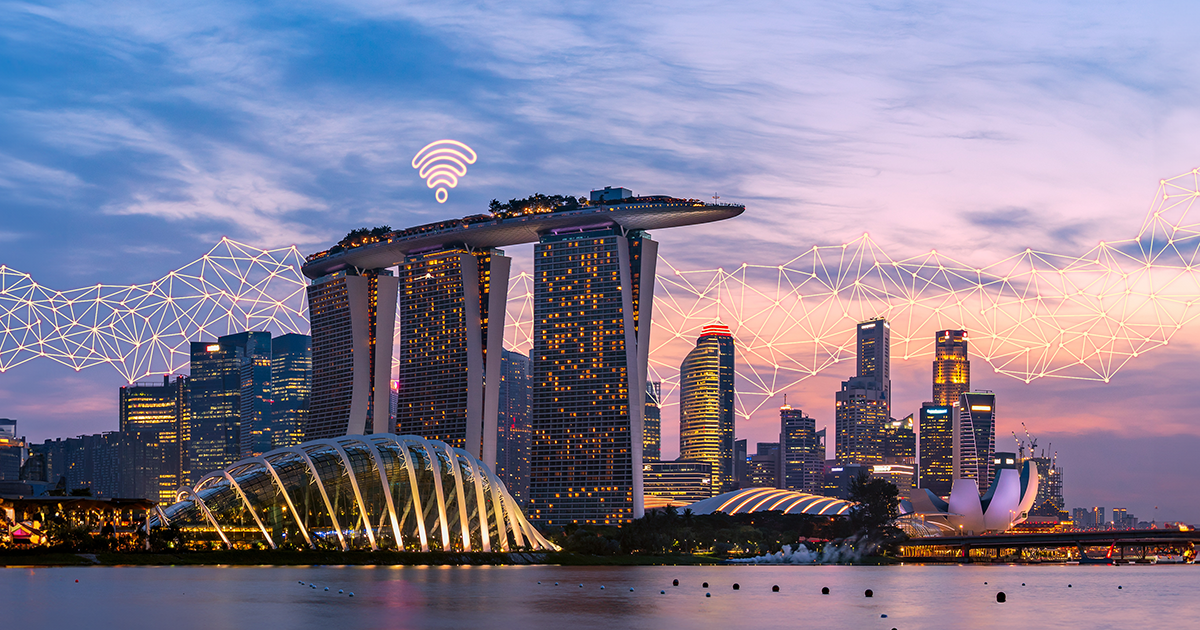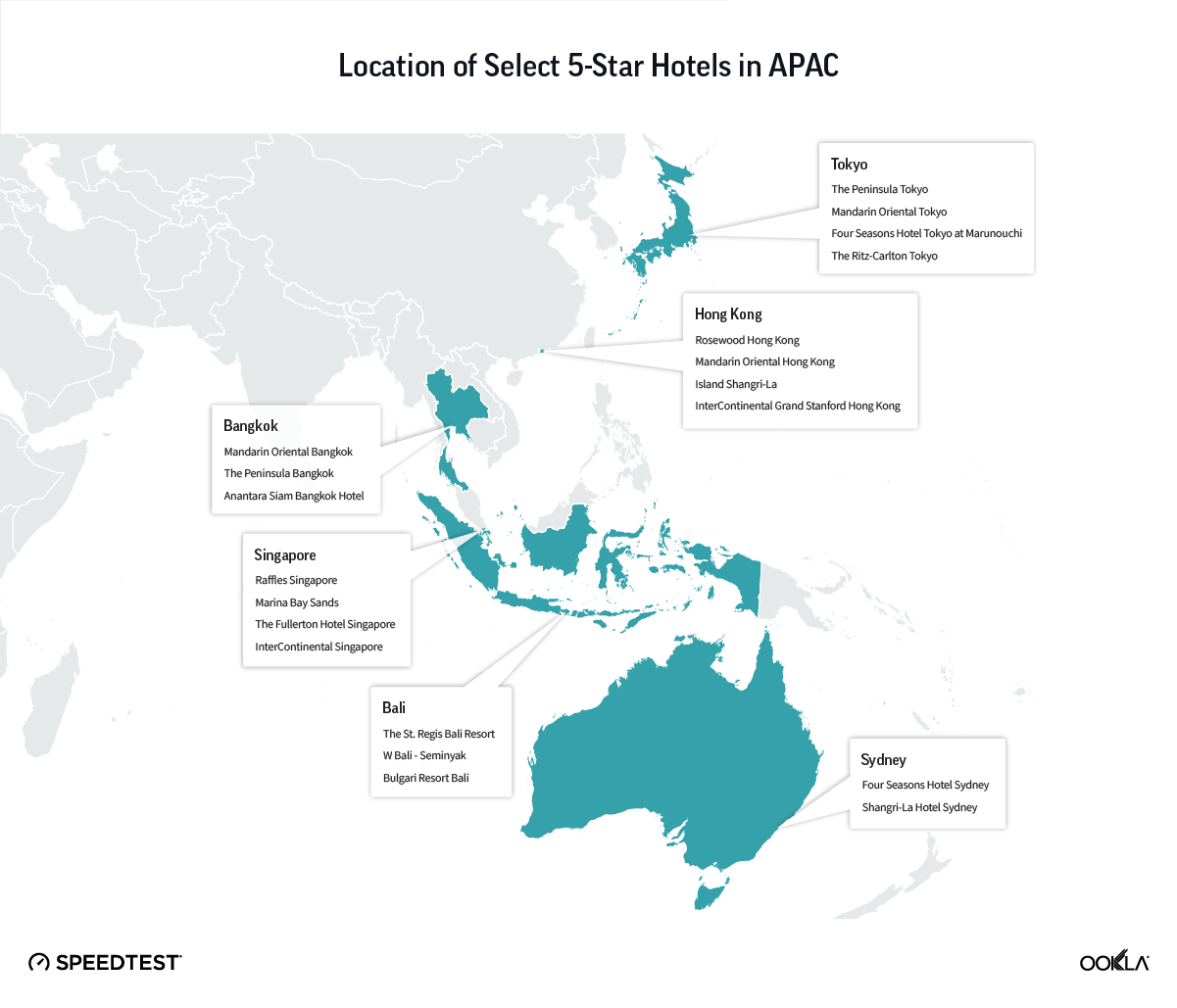For business travelers, fast and reliable Wi-Fi is no longer a luxury—it’s a necessity. In today’s digital-first business environment, seamless connectivity enables real-time communication, access to cloud-based applications, and virtual meetings, all of which are critical for productivity and efficiency. A hotel’s Wi-Fi quality plays a major role in a business traveler’s accommodation choice, making high-speed internet a key differentiator for luxury hotels in APAC’s top business cities.
Key Takeaways
- Only five out of the selected 20 hotels provided Wi-Fi with a median download speed of at least 100 Mbps. The majority of selected hotels fall into either the good performers category (50–100 Mbps) or the laggards category (below 50 Mbps). Leading hotels such as The Peninsula Tokyo and Rosewood Hong Kong demonstrate the benefits of investing in high-quality Wi-Fi infrastructure.
- Having a strong national broadband infrastructure does not guarantee fast hotel Wi-Fi. Even in cities with strong broadband infrastructure like Singapore, inconsistent hotel speeds highlight the need for better in-house network optimization. Raffles Singapore and InterContinental Singapore, for example, recorded some of the lowest speeds at 21.35 Mbps and 20.03 Mbps, respectively, underscoring the importance of proper Wi-Fi setup for a better guest experience.
- Wi-Fi performance in APAC luxury hotels strongly correlates with the adoption of modern technology and effective frequency band usage. Top-performing hotels lead with 47.1% of tests conducted on Wi-Fi 6 and a high reliance on the 5 GHz band (88.4%), delivering faster speeds and more stable connections. In contrast, hotels with download speeds less than 50 Mbps relied heavily on outdated standards, with 75.2% of tests conducted on Wi-Fi 4 and Wi-Fi 5 and only 69.8% of their tests using the faster 5 GHz band.
Connectivity is a key factor for business travelers in APAC
The Asia-Pacific (APAC) region remains a major hub for global business travel, driven by strong economic growth and dynamic markets. In 2023, business travel spending in APAC surged by 41%, reaching US$567 billion, with projections to exceed US$800 billion by 2027. The top five business meeting destinations in APAC; Singapore, Tokyo, Bangkok, Hong Kong, and Sydney, serve as major business hubs, attracting professionals from around the world.
This report analyzes Wi-Fi performance in selected 5-star hotels across the five cities: Singapore, Tokyo, Bangkok, Hong Kong, and Sydney, with the addition of hotels in Bali, a key location for international conventions and events such as the G20 Bali Summit, the APEC Summit, and the World Bank Annual Meeting.
Map: List of selected hotels and location (cities)
APAC luxury business hotels show mixed Wi-Fi performance
Using Speedtest Intelligence® data, we analyzed median download speeds inside and around selected hotel properties throughout 2024. This year-long period allows us to assess Wi-Fi performance and stability under varying hotel occupancy levels and guest profiles. To ensure data reliability, we excluded hotels with insufficient measurement samples and focused only on the most commonly used Wi-Fi network at each hotel—typically the one freely accessible to guests.
The Wi-Fi download speeds of selected hotels across major APAC business destinations show significant variation, with some properties delivering top-tier connectivity while others fall short. In a similar report that analyzed Wi-Fi download speeds of luxury hotels in the MENA region, we categorized the results to three groups of hotels based on Wi-Fi download speed:
- Top performers are hotels that offer exceptionally fast Wi-Fi, with median download speeds exceeding 100 Mbps. Such speeds provide seamless connectivity for business travelers, enabling ultra-high-definition video conferencing, large file transfers, and lag-free virtual collaboration. These results suggest that these hotels have made significant investments in high-performance Wi-Fi infrastructure, ensuring a premium experience for their guests.
- Good performers offer solid Wi-Fi performance, ranging between 50 Mbps and 100 Mbps. These speeds are sufficient for most business activities, including video conferencing, cloud-based work, and high-speed browsing. While they don’t reach the top-tier speeds of the leading hotels, they still provide a strong and stable connection for business travelers.
- Performance laggards include hotels with a median download speed below 50 Mbps, which may impact business travelers relying on high-speed internet for seamless virtual meetings, large data transfers, or streaming-intensive work applications.
Top performers represent 23.8% of the properties reviewed in this report. The Peninsula Tokyo is a leader, offering nearly double the speed (188.57 Mbps) of the next best hotel, Rosewood Hong Kong (113.21 Mbps). The InterContinental Grand Stanford Hong Kong also secured a position among the top performers, with a reported download speed of 109.74 Mbps, reinforcing Hong Kong’s strong presence in high-quality hotel Wi-Fi infrastructure.
The good performers category included properties such as Island Shangri-La Hong Kong (99.33 Mbps), Four Seasons Hotel Sydney and Tokyo (99.05 Mbps and 80.68 Mbps respectively), Mandarin Oriental Bangkok (88.58 Mbps), The Ritz-Carlton Tokyo (73.46 Mbps), and Marina Bay Sands Singapore (70.51 Mbps). These speeds are sufficient for most business activities, including video conferencing, online collaboration, and cloud-based applications. Notably, hotels in Bali, such as W Seminyak Bali and The St. Regis Bali Resort performed well, recording download speeds of 56.63 Mbps and 50.25 Mbps respectively, suggesting that luxury resorts catering to international business events are prioritizing strong internet connectivity. The presence of multiple Four Seasons properties in this range also indicates that while this chain generally provides good connectivity, they do not always reach the highest tier of performance.
Almost all of the cities have hotels in the laggards’ category. Despite Singapore’s strong fixed broadband infrastructure, and consistently topping Speedtest Global Index fixed broadband ranking, hotel Wi-Fi performance varied significantly. This suggests that the issue is most likely with the Wi-Fi network configuration rather than national broadband capacity. Raffles Singapore and InterContinental Singapore recorded some of the lowest speeds in the list, at 21.35 Mbps, and 20.03 Mbps respectively.
Modern Wi-Fi technology boost hotel connectivity performance
Many factors influence Wi-Fi performance, including network design and the number of users connected to each access point (AP). Wi-Fi technology has also evolved significantly, with each generation introducing key improvements in speed, efficiency, and capacity. Rolling out modern, well-configured Wi-Fi equipment enhances reliability while maximizing the performance benefits of newer Wi-Fi technology.
Speedtest Intelligence data reveals a clear correlation between Wi-Fi standards and network performance across the three categories. Top performers reported more test samples on Wi-Fi 6 (47.1%), with a smaller share using Wi-Fi 5 (32.9%) and Wi-Fi 4 (20.0%). In contrast, good-performing hotels reported 61.9% of samples were on Wi-Fi 5, with only 21% utilizing Wi-Fi 6. Performance laggards rely more on older Wi-Fi 4 and Wi-Fi 5 setups, with a combined total of 77.7% of test samples reported on these two Wi-Fi standards.
The distribution of Wi-Fi frequency bands further demonstrates the impact of network optimization on hotel performance. Hotels in the Top Performers category conducted 88.4% of their tests on the 5 GHz frequency band, followed by 80.8% for Good Performers hotels. Performance Laggards reported the lowest distribution at 64.6%.
Meeting the needs of modern business travelers
Reliable, high-speed Wi-Fi is essential for business travelers in luxury hotels. Poor connectivity disrupts productivity, affects virtual meetings, and leads to guest dissatisfaction. To remain competitive, hotels must invest in strategic Wi-Fi planning and infrastructure upgrades to meet the increasing connectivity demands of business travelers.
Effective Wi-Fi planning requires upgrading to modern standards such as Wi-Fi 6E or 7, thereby unlocking wider channels in the 6 GHz band to help alleviate congestion, and optimizing network capacity for high-density environments. Hotels must assess access point placement, bandwidth allocation, interference management, and simultaneous device connections to ensure a seamless experience for guests.
To address these connectivity gaps, professional Wi-Fi design solutions like Ekahau help hotels optimize network configurations from the outset. These tools enable precise access point placement, configuration, and performance monitoring, ensuring reliable coverage and high-speed connectivity across all areas of the hotel. Proper planning and investment in advanced Wi-Fi infrastructure are critical for delivering a seamless and high-quality digital experience for business travelers.
Ookla can assist hospitality property managers in designing Wi-Fi networks, monitoring their performance, and optimizing them. Please contact us to learn more about Speedtest Intelligence and Ekahau.
Ookla retains ownership of this article including all of the intellectual property rights, data, content graphs and analysis. This article may not be quoted, reproduced, distributed or published for any commercial purpose without prior consent. Members of the press and others using the findings in this article for non-commercial purposes are welcome to publicly share and link to report information with attribution to Ookla.



